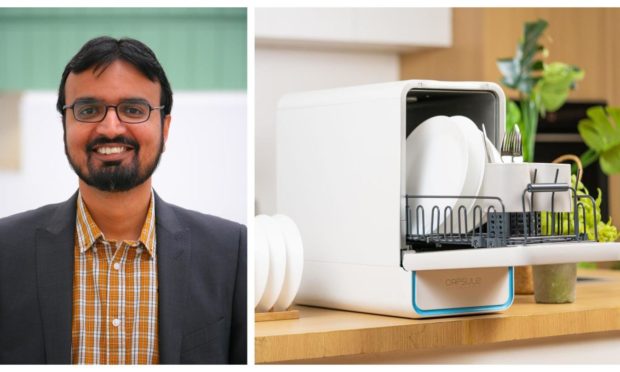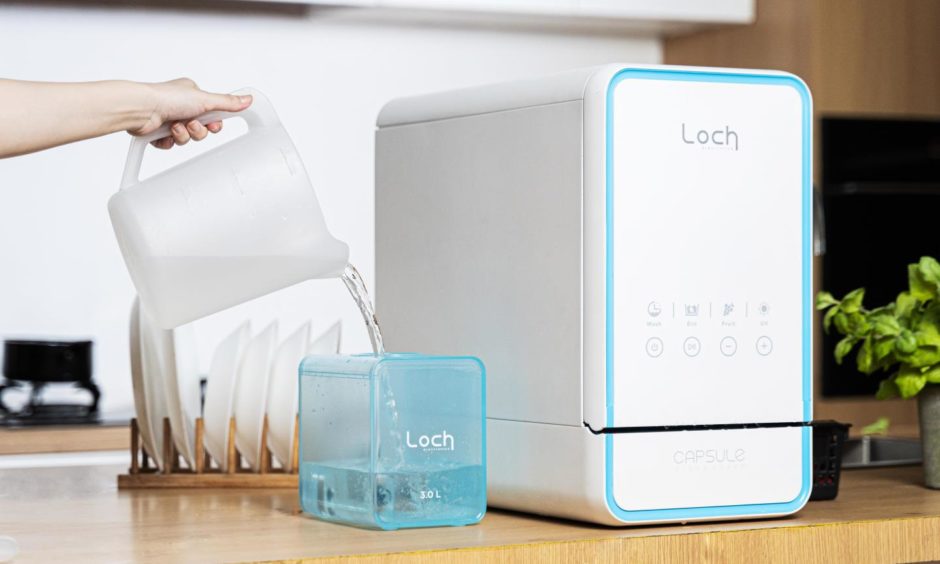A mini dishwasher that uses ultraviolet light to reduce energy consumption could make a “huge contribution” toward the UK reaching net zero, an Aberdeen academic has argued.
Researchers from Robert Gordon University have helped the Edinburgh-based company Loch Electronics to design the Capsule dishwasher, which has just under £250,000 pounds worth of backing on the online crowdfunding platform Kickstarter.
The device, created to be small enough to sit on a countertop, has been created for smaller households and to reduce the impact of doing the washing up on the environment.
Ultraviolet cleaning
Senior mechanical engineering lecturer Taimoor Asim is one of four RGU experts who have helped bring the idea to life.
Mr Asim and his colleagues applied their knowledge of mechanical design and fluid dynamics to help create the product, and they hope it will help play a part in government ambitions to cut UK greenhouse gas emissions to net zero by 2050.
By utilising ultraviolet light to help disinfect dirty dishes “working hand-in-hand” with water, Mr Asim explained the Capsule uses less energy compared to normal dishwashers.
He said: “Typically, you would normally have up to around 75C temperature water, which will give you a very good cleaning of your utensils and plates in your dishwasher.
“We are using the UV lights to reduce the burden on warm water for the cleaning, and using the UV lights to contribute towards the cleaning.
“Because UV light are taking some of the burden of cleaning, we can use the water at a much reduced temperature, something like 55C, which is better for the environment because it’s much less energy being used.
“The water and UV light work hand-in-hand to do more effective cleaning, better disinfection and reduce energy consumption to help us move more quickly towards net zero.”
Designed for smaller households
Mr Asim explained the smaller size of the Capsule has been designed for single or two-person households and only takes 15 minutes, and around two jars worth of water, to wash two meal’s worth of dishes.
Loch Electronics also claims the device can save 86% on water use, and 73% on energy consumption compared to washing dishes by hand.
He continued: “Conventional dishwashers can be too big for single-occupant households, or households with two people, so the question was can we make it more compact, and consume significantly less energy from the grid.
“You can imagine how many dishwashers are in use across the UK, and we’re talking in millions here, so if we can make even a slight reduction in energy consumption, that will be a huge contribution towards our ambitious goals of reaching net zero.
“How, collectively, we can help towards reducing our impact on the climate through making modifications to our lifestyles?
“There are many very small steps we can take, and this project is one of them.
“The less the energy we’re consuming, the lesser our climate footprint will be, and the less severity our impact on the climate will be.”
Carbon footprint
The lecturer says he calculates his own carbon footprint on a monthly basis, and actively works to cut down on his own impact.
He added: “I am extremely, extremely happy to be able to contribute, on a personal note, on something that will have a positive impact on our environment.
“Whatever contribution we can make towards achieving net zero, I’m extremely proud of that.”



